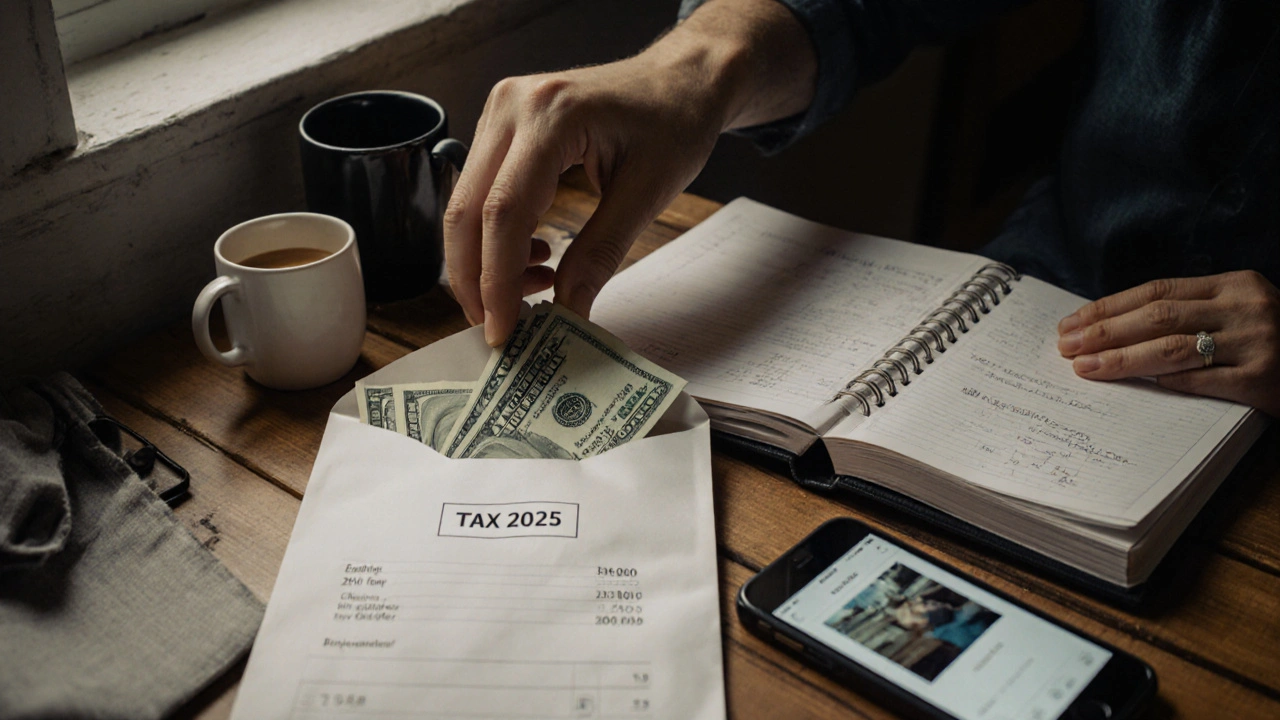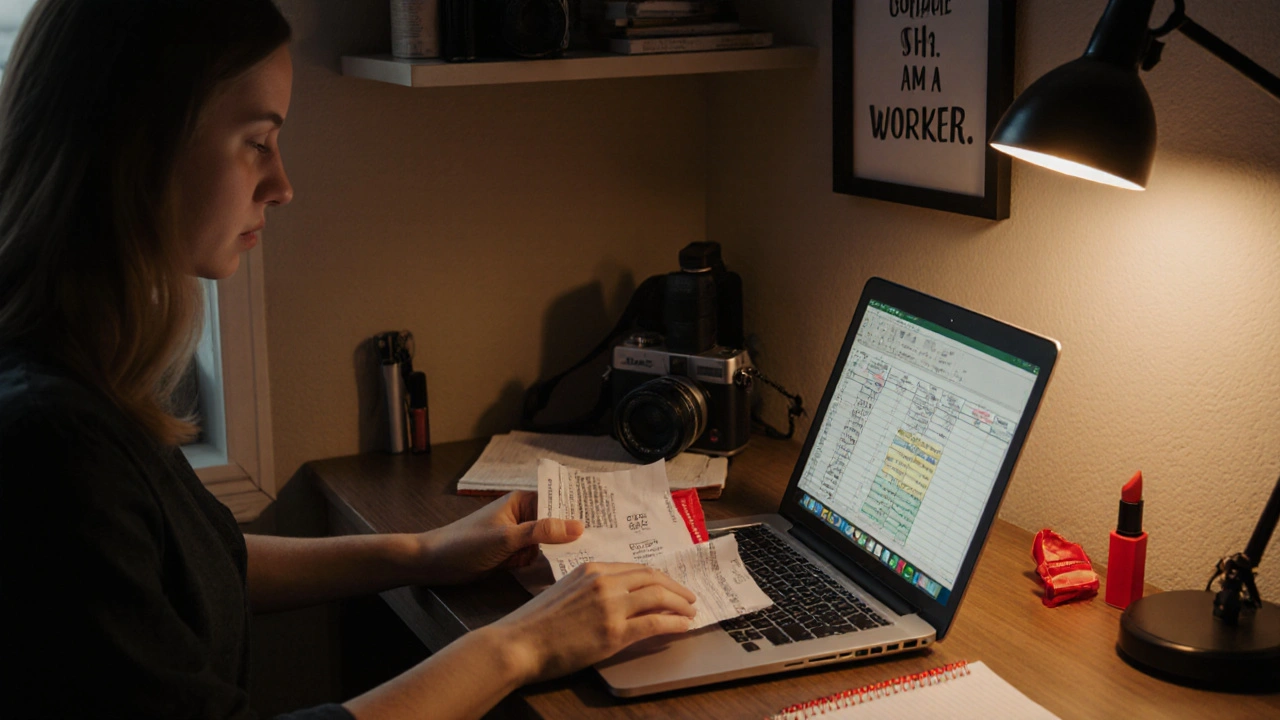If you're a sex worker in Australia and you're earning income, you're required to pay taxes-just like any other self-employed person. There’s no special law that says sex work is exempt from tax. The Australian Taxation Office (ATO) doesn’t care what your job is, only that you’re earning money and you’re not hiding it. Many sex workers avoid filing because they’re scared of being judged, but the truth is, filing taxes can protect you. It builds a paper trail. It proves you’re operating legally. And it opens the door to deductions that can cut your tax bill significantly.
What the ATO Says About Sex Work Income
The ATO treats sex work exactly like any other self-employed business. Whether you work independently, through an agency, or online, your income is taxable. You must declare every dollar you earn, including cash payments, tips, and money from platforms like OnlyFans or subscription services. The ATO doesn’t need to know the nature of your services-only the amount. In 2023-2024, over 1,200 Australians declared income from sex work on their tax returns. That number is likely higher, since many don’t report. But those who do report often get refunds because of deductions.
You’re not breaking the law by declaring income from sex work. In fact, the ATO encourages it. They’ve published official guidance on their website titled “Income from illegal activities”, which clearly states: “Even if your income comes from illegal activities, you still need to declare it.” The law doesn’t change based on your job title. If you earn money, you owe tax.
Are You Self-Employed or an Employee?
This is the first question you need to answer. Most sex workers are classified as self-employed. That means you run your own business. You decide your hours, your rates, your clients, and how you operate. If you’re working independently, you’re likely self-employed. If you’re working for an agency that controls your schedule, sets your prices, and provides your clients, you might be an employee. But that’s rare in this industry.
Being self-employed means you’re responsible for your own tax. You don’t get a PAYG statement like a regular employee. You need to track your income and expenses yourself. You also need to pay your own superannuation, unless you choose to make voluntary contributions. You’ll file a personal tax return each year and may need to pay quarterly PAYG instalments if your tax bill is over $1,000.
What You Can Deduct (And What You Can’t)
As a self-employed person, you can claim deductions for anything you use directly in your business. The ATO doesn’t care if your business is legal or not-they only care if it’s necessary and directly related to earning income.
Here’s what you can claim:
- Home office expenses-if you work from home, you can claim a portion of your rent, electricity, internet, and phone. Use the fixed rate method (86 cents per hour) or the actual cost method if you keep detailed records.
- Transport costs-fuel, public transport, or mileage if you travel to meet clients. Keep a logbook for at least 12 weeks if you’re claiming car expenses.
- Business equipment-cameras, microphones, laptops, lighting, props, and even lingerie or costumes if they’re used solely for work.
- Marketing and advertising-website hosting, social media ads, business cards, or even professional photos.
- Health and safety items-condoms, gloves, testing kits, and even self-defense tools like pepper spray or personal alarms.
- Professional services-accountant fees, legal advice, or business coaching.
- Training and education-courses on safe sex practices, client communication, or financial literacy.
Here’s what you can’t claim:
- Personal clothing you wear outside of work.
- Meals you eat while working-unless you’re traveling overnight for business.
- Any fines or penalties from law enforcement.
- Expenses paid for by clients.
Remember: You need receipts. The ATO doesn’t accept guesses. If you’re audited and can’t prove your claims, you’ll lose them. Start saving every receipt now-even if it’s just a photo of a receipt on your phone.

Keeping Records: What You Need and How to Do It
The ATO requires you to keep records for five years. That includes income, expenses, and any documents that support your claims. You don’t need fancy software. You don’t need a bookkeeper. But you do need consistency.
Here’s a simple system that works:
- Track income daily-Use a notebook, spreadsheet, or free app like Zoho Expense or Google Sheets. Write down the date, amount, and source (e.g., “Client A - $150 cash,” “OnlyFans - $80 online”).
- Save every receipt-Take a photo of every receipt, invoice, or bank statement. Store them in a folder on your phone or cloud drive labeled “Tax 2025.”
- Separate business and personal finances-Open a separate bank account for your work income. Even if you’re not earning much, this makes tracking easier and looks professional if you’re ever questioned.
- Use a simple spreadsheet-Create two columns: Income and Expenses. Add a third for category (e.g., “Transport,” “Marketing”). Update it every week.
Many sex workers use the “Envelope System”-a physical envelope for cash income and another for receipts. It’s low-tech but effective. The goal isn’t perfection. It’s proof.
What Happens If You Don’t File?
Not filing taxes doesn’t make the income disappear. The ATO has tools to detect unreported income. They cross-check bank transactions, digital payments, and even data from platforms like PayPal or Stripe. If you’re earning over $10,000 a year and never file, you’re at risk.
If you’re caught, you’ll owe back taxes, plus interest and penalties. Penalties can be as high as 75% of the unpaid tax if the ATO thinks you were deliberately hiding income. But if you come forward voluntarily through the ATO’s Voluntary Disclosure program, penalties are often reduced or waived. The ATO says they’d rather help you get compliant than punish you.
It’s never too late to fix it. Many people start filing late and get back on track. You can even file for previous years. You won’t get in trouble for being honest now.
How to Get Help
You don’t have to do this alone. There are accountants who specialize in working with sex workers. They know the ATO’s rules and won’t judge you. Look for firms that advertise “inclusive accounting” or “LGBTQ+ friendly services.” In Perth, several accountants offer free 15-minute consultations for sex workers.
There are also free services like the Community Legal Centres and Sex Workers Outreach Project (SWOP) Australia. They offer tax workshops and can connect you with pro-bono accountants. You don’t need to be a member. You don’t need to prove your identity. Just show up.
Some people worry that telling an accountant they’re a sex worker will get them reported. That’s not true. Accountants are bound by confidentiality laws. They can’t report you to the police or ATO unless you’re involved in money laundering or child exploitation-which has nothing to do with consensual adult work.

Why This Matters Beyond Money
Filing taxes isn’t just about avoiding penalties. It’s about building a life with dignity. When you declare your income, you’re saying: “I’m not hiding. I’m not ashamed. I’m a worker.” That mindset changes how you see yourself. It changes how others see you.
Having a tax history helps if you ever need a loan, rent an apartment, or apply for a visa. Landlords and banks ask for tax returns. If you’ve never filed, you’re locked out. If you have five years of returns, you’re seen as reliable.
It also protects you in emergencies. If you get sick, injured, or need legal help, having financial records proves your income. It shows you’re not dependent on anyone else. It gives you power.
Sex work is work. And like any work, it deserves respect-especially from the system that taxes it. You’re not asking for special treatment. You’re asking for the same rights everyone else has: to keep what you earn, to claim what you spend, and to be treated like a human being.
Frequently Asked Questions
Do I have to tell the ATO what kind of work I do?
No. You only need to declare your income and expenses. You don’t need to specify that you’re a sex worker. On your tax return, you can list your business as “Independent Contractor” or “Self-Employed Services.” The ATO doesn’t require details about the nature of your services.
Can I claim my car if I use it for work?
Yes. You can claim car expenses using either the logbook method (track your business use over 12 weeks) or the cents-per-kilometre method (86 cents per km for up to 5,000 km per year). Keep a simple diary of dates, distances, and purpose of trips.
What if I get paid in cash?
Cash is still income. Record every cash payment in your logbook with the date and amount. If you deposit cash into your bank account, keep a note of it. The ATO doesn’t care how you’re paid-they care that you report it.
Can I claim expenses if I work online only?
Absolutely. If you work through OnlyFans, Patreon, or a personal website, you can claim website hosting fees, camera equipment, lighting, editing software, and even internet and electricity used for your business. Keep receipts for subscriptions and purchases.
Is it risky to use an accountant?
No. Accountants are legally required to keep your information confidential. They can’t report you to police or immigration. Many accountants work with sex workers regularly and understand the stigma. Look for ones who say they’re LGBTQ+ friendly or have experience with non-traditional income.
What if I’m undocumented or on a visa?
You still need to pay tax on income earned in Australia. Filing taxes doesn’t affect your visa status. The ATO doesn’t share tax data with immigration. Many undocumented workers file using a Tax File Number (TFN) and get refunds. Not filing puts you at greater risk if you’re ever audited or need financial proof.
Next Steps
Start today. Open a free Google Sheet. Write down your income from the last month. Save one receipt. That’s it. You don’t need to do everything at once. Just begin.
By the end of this month, you’ll have a record. By the end of the year, you’ll have proof. And when tax time comes, you won’t be scrambling. You’ll be ready.
You’re not a criminal. You’re not a burden. You’re a worker. And you deserve to keep what you earn-without fear.
